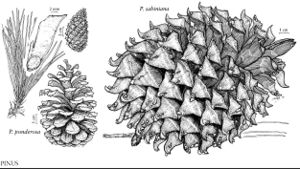Pinus ponderosa
Agric. Man. 354. 1836.
Trees to 72m; trunk to 2.5m diam., straight; crown broadly conic to rounded. Bark yellow- to red-brown, deeply irregularly furrowed, cross-checked into broadly rectangular, scaly plates. Branches descending to spreading-ascending; twigs stout (to 2cm thick), orange-brown, aging darker orange-brown, rough. Buds ovoid, to 2cm, fully 1cm broad, red-brown, very resinous; scale margins white-fringed. Leaves 2–5 per fascicle, spreading to erect, persisting (2–)4–6(–7) years, 7–25(–30)cm × (1–)1.2–2mm, slightly twisted, tufted at twig tips, pliant, deep yellow-green, all surfaces with evident stomatal lines, margins serrulate, apex abruptly to narrowly acute or acuminate; sheath 1.5–3cm, base persistent. Pollen cones ellipsoid-cylindric, 1.5–3.5cm, yellow or red. Seed cones maturing in 2 years, shedding seeds soon thereafter, leaving rosettes of scales on branchlets, solitary or rarely in pairs, spreading to reflexed, symmetric to slightly asymmetric, conic-ovoid before opening, broadly ovoid when open, 5–15cm, mostly reddish brown, sessile to nearly sessile, scales in steep spirals (as compared to Pinus jeffreyi) of 5–7 per row as viewed from side, those of cones just prior to and after cone fall spreading and reflexed, thus well separate from adjacent scales; apophyses dull to lustrous, thickened and variously raised and transversely keeled; umbo central, usually pyramidal to truncated, rarely depressed, merely acute, or with a very short apiculus, or with a stout-based spur or prickle. Seeds ellipsoid-obovoid; body (3–)4–9mm, brown to yellow-brown, often mottled darker; wing 15–25mm.
Distribution
B.C., Ariz., Calif., Colo., Idaho, Mont., N.Dak., N.Mex., Nebr., Nev., Okla., Oreg., S.Dak., Tex., Utah, Wash., Wyo., Mexico.
Discussion
Pinus ponderosa is the most economically important western yellow pine. Its wood is more similar in character to the white pines, and it is often referred to as white pine. The taxonomy of this complex is far from resolved.
Ponderosa pine (Pinus ponderosa) is the state tree of Montana.
Varieties 3 (3 in the flora).
Selected References
None.
Lower Taxa
Key
| 1 | Leaves mainly 2-3 per fascicle, (7-)10-17 cm. | Pinus ponderosa var. scopulorum |
| 1 | Leaves mainly 3-5 per fascicle, (7-)12-25(-30) cm. | > 2 |
| 2 | Buds very resinous; leaves commonly 3 per fascicle, 12-25(-30) cm × (1.2-)1.5-2 mm; pollen cones mostly red; seed cones 8-15 cm; twigs commonly not glaucous. | Pinus ponderosa var. ponderosa |
| 2 | Buds slightly resinous; leaves commonly 4-5 per fascicle, 7-17 cm × 1-1.2(-1.5) mm; pollen cones mostly yellow; seed cones 5-8 cm; twigs usually glaucous. | Pinus ponderosa var. arizonica |
